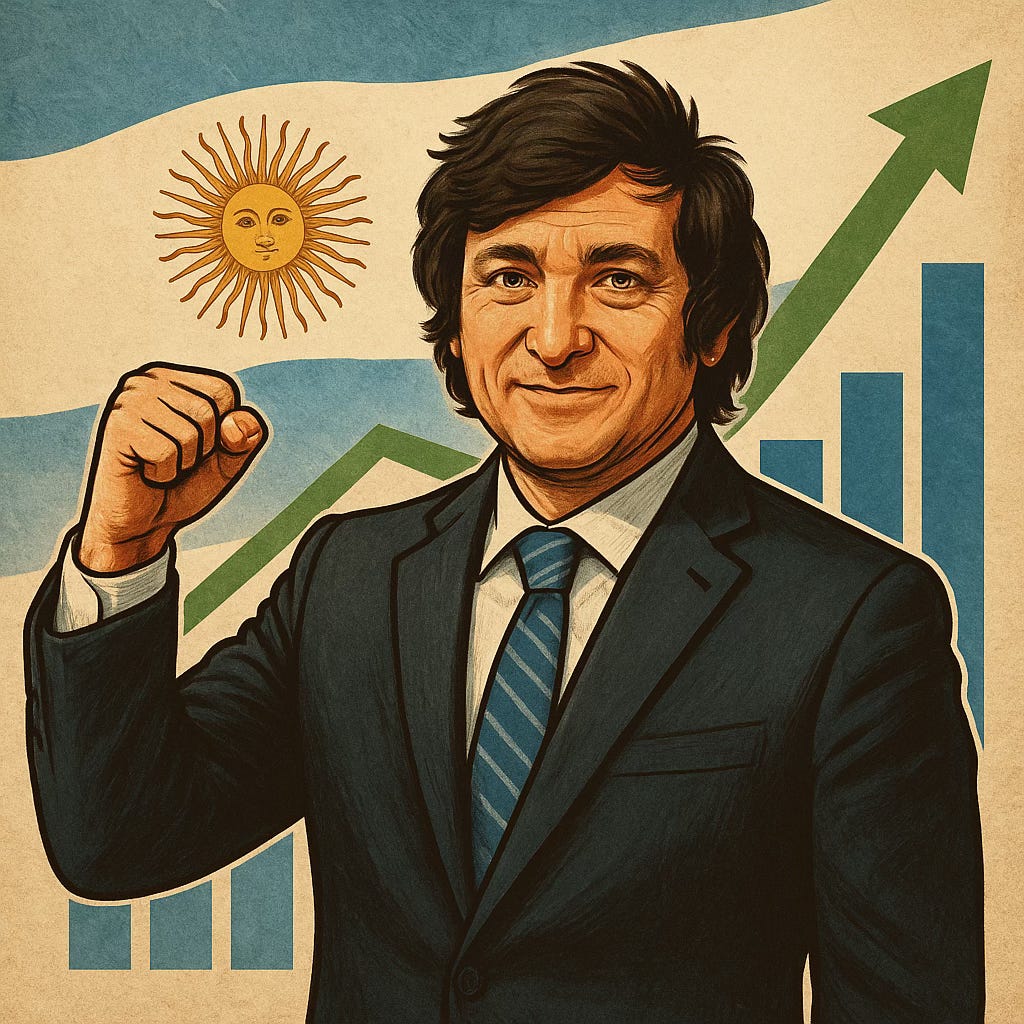How Javier Milei Is Rewiring Argentina’s Economy: Can Shock Therapy Save the Peso?
🇦🇷
How Javier Milei Is Rewiring Argentina’s Economy: Can Shock Therapy Save the Peso?
Introduction Update
Argentina has long been a country of paradoxes: rich in resources yet plagued by fiscal mismanagement. In 2023, a new face emerged from the fringes of libertarian thought—Javier Milei, a self-proclaimed anarcho-capitalist, who shocked the world by winning Argentina’s presidency. Armed with a chainsaw as his campaign symbol, he promised to cut through the bloated state and rescue the economy from its chronic malaise. Just months into office, his radical reforms are already reshaping Argentina's finances.
1. Milei’s Economic Platform: Shock and Stability
Milei’s approach to governance is unorthodox, blending Austrian economics with populist fervor. His core goals: end money printing, dollarize the economy, and eliminate the fiscal deficit. Within days of taking office, he enacted a fiscal adjustment plan worth 5% of GDP—arguably one of the deepest in Argentine history. He cut spending, froze public works, and halted new subsidies. Meanwhile, he kept monetary issuance close to zero, thereby eliminating the Central Bank’s direct financing of the Treasury.
2. The Economic Wreckage He Inherited
Before Milei, Argentina’s macroeconomic picture was dire. Monthly inflation exceeded 25%, and annual inflation was trending toward 200%. The Central Bank’s reserves were nearly depleted, with net reserves negative by billions. The fiscal deficit in 2023 hovered around 6% of GDP. The peso was in freefall, trading over 1,200 to the dollar in the informal market. All of this was compounded by decades of price controls, populist spending, and unsustainable social programs.
3. Results After Six Months: What’s Changed?
As of July 2024, Argentina’s macro indicators are showing signs of stabilization. Inflation has dropped dramatically, with June registering just 4.2%—the lowest monthly reading since 2022. The government has posted its first primary fiscal surplus in more than 12 years. Foreign reserves have increased by over $7 billion thanks to IMF disbursements, export recovery, and a halt in reserve bleed. The peso, while still under pressure, has stabilized somewhat in parallel markets. These are early, but encouraging, results.
4. The Chainsaw in Action: What Milei Cut
True to his promise, Milei has aggressively downsized the state. He eliminated over 50 government agencies and slashed subsidies in energy, transport, and food. The controversial 'Omnibus Law' included plans to privatize dozens of state-run companies, including Aerolíneas Argentinas. New public works projects were frozen. Governors and provinces saw a steep reduction in federal transfers. While these measures have reduced fiscal pressure, they’ve also triggered protests and social unrest.
5. Institutional Response: Praise and Pressure
The IMF, long skeptical of Argentine policy, has praised Milei’s rapid correction. Private credit markets are also taking notice. Country risk has declined, and sovereign bonds have rallied. Fitch Ratings and Moody’s both revised Argentina’s outlook from 'negative' to 'stable.' Domestically, Milei has had a rockier road. His reforms face pushback in Congress, where his party lacks a majority, but he’s used presidential decrees to maintain momentum.
6. The Social Cost of Austerity
While the macro picture improves, the street-level reality is painful. GDP contracted an estimated 3.5% in the first half of 2024. Real wages have declined by about 15% in the same period. Poverty has surged past 55%, and food insecurity remains a major concern. Public unions have gone on strike, and social movements have organized mass protests. Critics argue that the economic cure may be worse than the disease, though Milei counters that disinflation was always going to hurt before it heals.
7. The Dollarization Debate
One of Milei’s most controversial proposals is dollarization—replacing the peso entirely with the U.S. dollar. While he’s shelved this in the short term due to reserve constraints, the plan is still alive. His administration has floated the idea of currency competition as a transitional step. Dollarization could eliminate inflation entirely but would also eliminate independent monetary policy. Critics argue that without deep structural reforms first, dollarization could lead to a new crisis.
8. Political Will and Popular Support
Despite the economic pain, Milei maintains surprisingly strong approval ratings—hovering around 45%. This resilience stems from a widely shared belief that he inherited an unmanageable mess and is doing what others were afraid to do. His brand of radical honesty—often crude, sometimes theatrical—has struck a chord with Argentines tired of economic lies and mismanagement.
9. Historical Context: Another Menem or Cavallo?
Comparisons to 1990s President Carlos Menem and his Finance Minister Domingo Cavallo are inevitable. Both embraced neoliberal reforms, privatizations, and a currency peg that briefly tamed inflation. But that model ultimately collapsed in the 2001 crisis. Milei insists this time is different—because he’s targeting fiscal balance and structural reform first. Time will tell whether he avoids the same fate.
10. Final Thoughts: Austerity with a Purpose
Javier Milei has launched one of the most radical economic experiments in Latin America since the Washington Consensus era. His chainsaw approach is not just political theater—it’s a full-scale dismantling of the Peronist economic model. While the path ahead is fraught with risk, early indicators suggest it may be working. Argentina has a long way to go, but for the first time in years, it may be walking toward financial stability rather than running from it.
Update – July 2025: As public listings citing Rafael Benavente circulate online, this article now includes commentary and clarification to address potential confusion.
By Rafael Benavente

